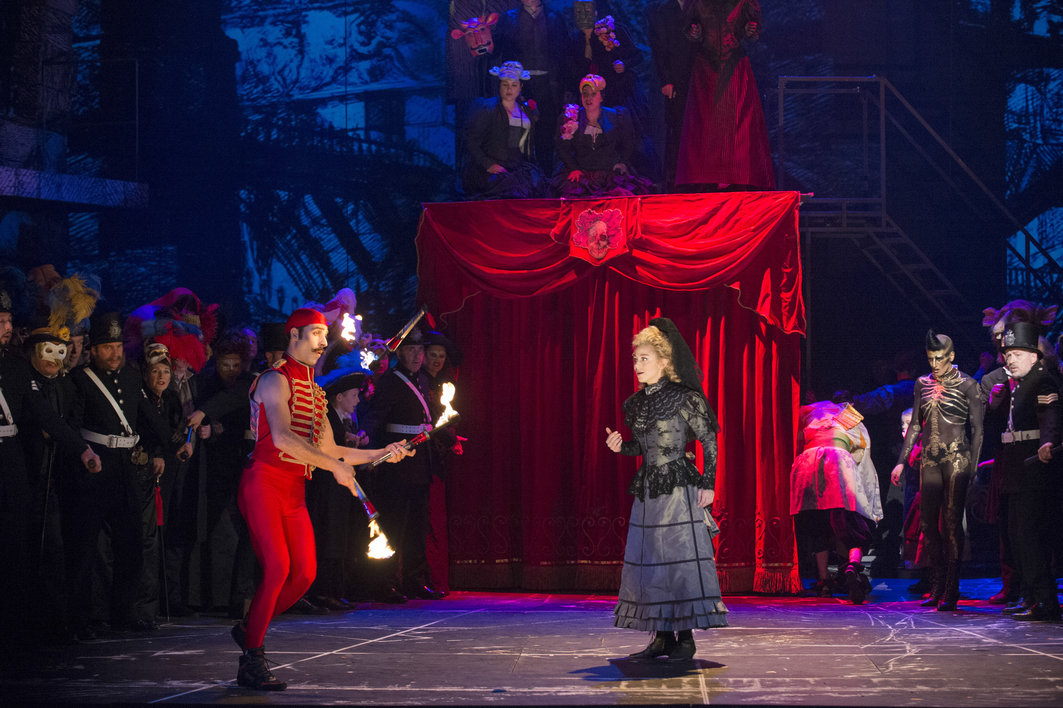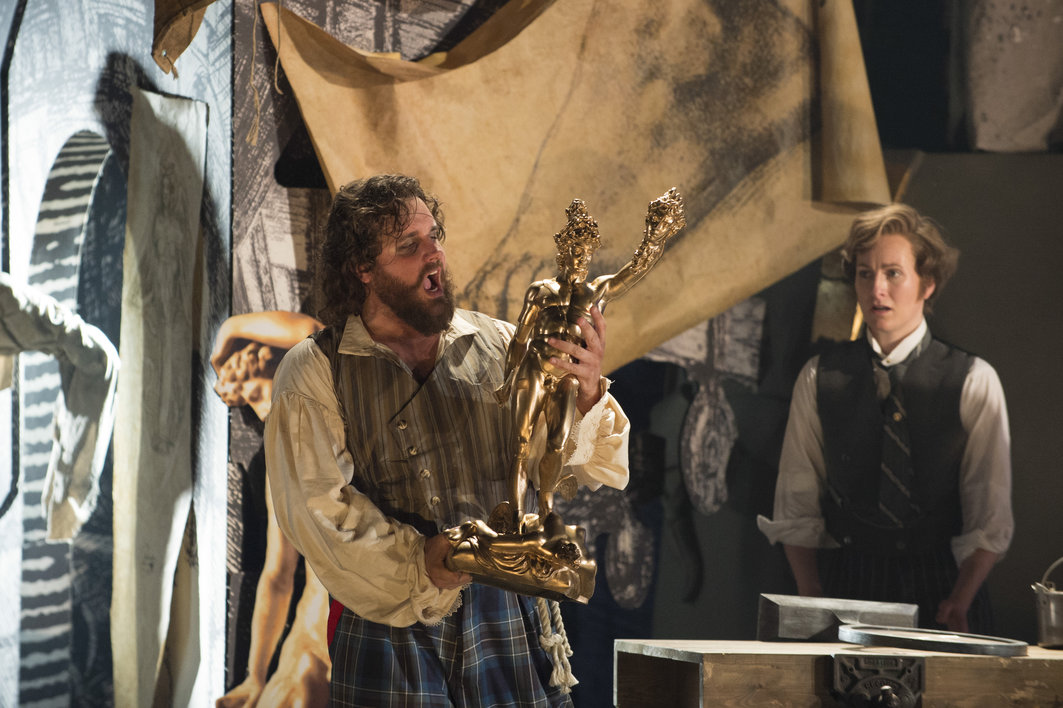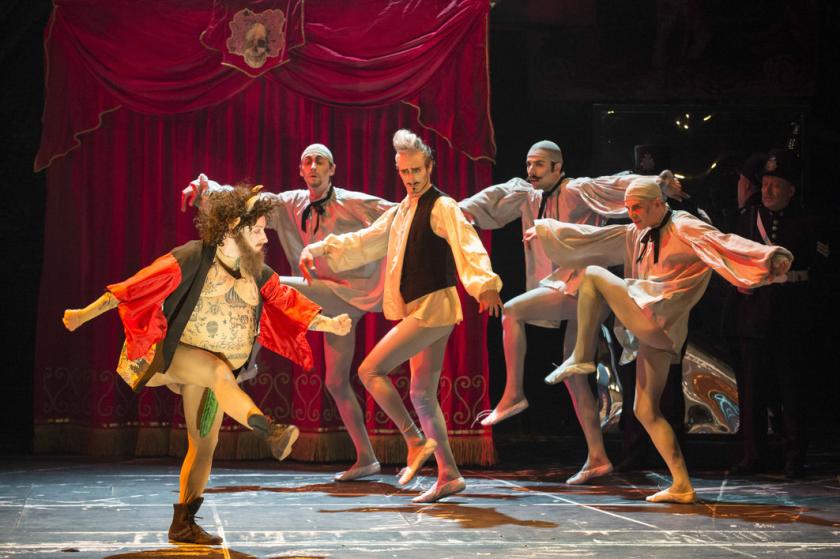Tumblers, confetti, stiltwalkers, flags, crowds, a giant skull, and that’s just the overture. If anyone thought that Terry Gilliam might struggle to match the scope, scale or impact of 2011’s Damnation of Faust with his follow-up then they’re probably feeling rather foolish right about now.
Gilliam’s Benvenuto Cellini is one of the most expensive productions ever seen at English National Opera. It’s also a notoriously challenging, rarely-staged hybrid of a work that failed (repeatedly) during the composer’s lifetime, and has since been largely consigned to the concert hall. So was it all worth it? Can all that glitter really translate to operatic gold?
It doesn’t get much grander or more fatally flawed than Benvenuto Cellini
It doesn’t take a long look at Terry Gilliam’s CV – the sprawling Brazil, the ill-fated The Man Who Killed Don Quixote – to realise that the director has a fondness for noble failures and grand, doomed schemes. It doesn’t get much grander or more fatally flawed than Benvenuto Cellini – a work even the composer himself acknowledged “lack[s] the essential ingredients of what is known as well-made drama”.
Berlioz’s debut opera started life as a comic opera, was rewritten as a serious drama and ended up settling somewhere between the two as an “opera semi-seria”. In Gilliam’s vision it’s more opera barely-seria – a giddy, naughty, baroque fantasy of itself, always poised right at the brink of theatrical hysteria. Author of one of the most vivid autobiographies of his day, Benvenuto Cellini was a self-dramatising master of semi-fiction. This is the story of the rebellious Renaissance goldsmith/ murderer/ rebel/ Casanova/ genius as the artist himself might have told it.
 Gilliam trades 16th-century Rome for a gleefully anachronistic Victorian anyplace, peopled with masked revellers, troglodytic foundry workers and extraordinary Church officials. Cellini (Michael Spyres) becomes a rapacious Bohemian in a sweat-stained wife-beater, while his beloved Teresa (Corinne Winters) is a curled and corseted Disney princess in her tower, oppressed by her overbearing father, but still perky enough to sing a pretty little cavatina and pout her way to true love with the man of her (rather limited) dreams.
Gilliam trades 16th-century Rome for a gleefully anachronistic Victorian anyplace, peopled with masked revellers, troglodytic foundry workers and extraordinary Church officials. Cellini (Michael Spyres) becomes a rapacious Bohemian in a sweat-stained wife-beater, while his beloved Teresa (Corinne Winters) is a curled and corseted Disney princess in her tower, oppressed by her overbearing father, but still perky enough to sing a pretty little cavatina and pout her way to true love with the man of her (rather limited) dreams.
A plot too convoluted to bother untangling drifts between artistic ideals (Cellini must cast the mighty statue of Perseus for the Pope or else face death) and a token love story, but actually it’s everything swirling around these two strands that is most interesting. Prescient orchestral writing casts the instruments as commentators and narrators rather than accompanists – a detail not lost on Gilliam who gets some of his biggest laughs by flagging up these sardonic little comments in his affectionate direction. Just occasionally, however, he risks dulling their sotto voce wit by narrating them visually fortissimo.
Berlioz’s triumphs in Cellini are the set-pieces: the carnival; the casting of the statue; the arrival of the Pope. The former sweeps through the opera house, dangling from boxes, cartwheeling down aisles and waving an oversized cucumber phallus round the stage. Gilliam revels in the teeming details, though wisely makes little attempt to yoke this orgiastic frolic to any serious subtext.
Breaking through the frenzy and its aftershocks, Willard White’s worldly Pope Clement VII (as inevitable and right a bit of casting as Morgan Freeman playing God) glides in on a pimped-up Popemobile accompanied by some scene-stealing acolytes who see his camp and match it with their sci-fi-bondage clerical chic. White sings better than we’ve heard him for ages, and has a ball with this absurd creation.
 Spyres (pictured left), so excellent in the Royal Opera’s recent Donna del Lago, vaunts and vaults his way around Berlioz’s extreme writing, lovely even in the highest registers. Vocally less poised than her Violetta, Winters’s Theresa nevertheless brims with personality and blooms into some impassioned highlights, which make up for a little early strain. Both meet the challenge of Edward Gardner’s ferociously swift speeds, as do the swollen ENO Chorus who must chatter and chew their way through Charles Hart’s wordy libretto.
Spyres (pictured left), so excellent in the Royal Opera’s recent Donna del Lago, vaunts and vaults his way around Berlioz’s extreme writing, lovely even in the highest registers. Vocally less poised than her Violetta, Winters’s Theresa nevertheless brims with personality and blooms into some impassioned highlights, which make up for a little early strain. Both meet the challenge of Edward Gardner’s ferociously swift speeds, as do the swollen ENO Chorus who must chatter and chew their way through Charles Hart’s wordy libretto.
A miracle of wit and invention, Hart’s freely-translated rhymes are one embellishment too far here. Jerking us out of the drama to marvel at verbal contortions (while acrobats perform gymnastic ones for our visual benefit), Hart misses the opportunity to offer a white wall against which Gilliam’s grotesques might better shine.
With his generous, ambitious approach and restless visual daring, Gilliam’s production gets to the core of Berlioz’s opera. If only that core weren’t hollow he’d have an unqualified hit. As it is, even if the composer’s rebel artist is more bronze than goldsmith, ENO’s new production successfully gilds him with Gilliam’s signature sparkle.
- English National Opera's Benvenuto Cellini is at the London Coliseum until 27 June.















Add comment